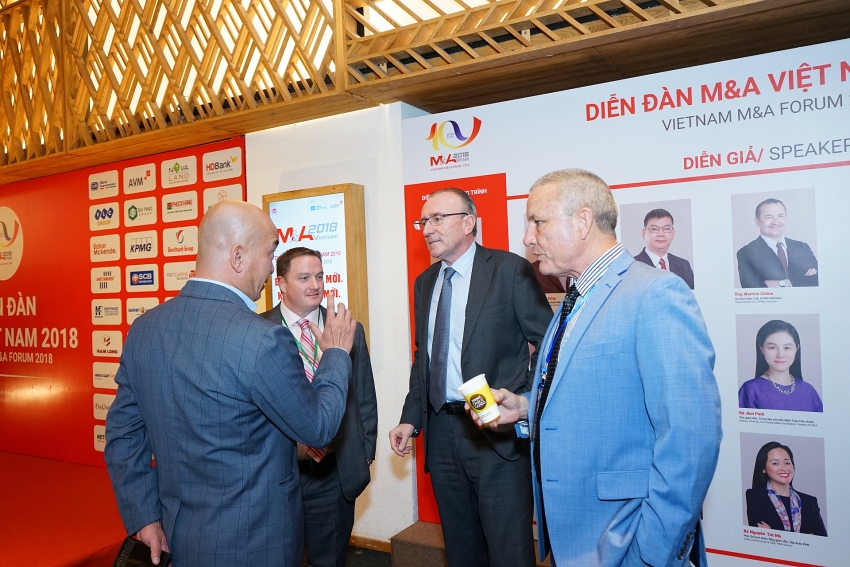M&A in real estate soars to historic record
According to Dominic Scriven, chairman of Dragon Capital, the scale of the M&A market in Vietnam is now equal to those of Indonesia and Malaysia.
“I think that the scale of M&A in Vietnam could pass these two markets in the coming years. 2018 in particular will be a record year for M&A in the Vietnamese real estate sector,” he said.
 |
| Foreign investors are extremely keen on M&A prospects in real estate. Photo: Le Toan |
Real estate remains among the three sectors attracting the most FDI capital to Vietnam. South Korea, Japan, Singapore, China, and Hong Kong are the five largest real estate investors in the country.
According to Recof Corporation’s managing director Masataka Sam Yoshida, real estate was one of the sectors receiving the most M&A capital from Japan.
Japanese investors Hankyu Realty and Nishi-Nippon Railroad have been co-operating with Nam Long Group to carry out a series of housing development projects in Vietnam. So far, these investors have acquired and developed five large-scale housing projects and offered thousands of units to southern Vietnam.
“Japanese investors are now aiming to pour $9-10 billion into Vietnam over the next few years, mostly into infrastructure development and real estate. I am sure that the size of M&A transactions will increase in the near future, especially when it comes to mid-range projects,” said Yoshida.
Troy Griffiths, deputy director of Savills Vietnam, said that foreign investors remain very interested in the Vietnamese property market. Much of the capital pouring into the country came through M&A deals, he said.
“We can see that M&A activities across the region have been pretty hectic. The listed market has been particularly active, with over $1 billion collected through listings on the Vietnamese stock exchanges in the first quarter of 2018,” Griffiths said.
Moreover, the tightening of financial policies for the real estate sector as well as the increased control of the State Bank of Vietnam over non-performing loans have also encouraged domestic investors to look for new financial sources, including M&A, Griffiths added.
“Hundreds of millions of dollars are waiting to be invested in Vietnam, mostly in the residential, office for lease, and hotel segments as well as in industrial zones. The stable development of the economy is pulling investment from Japan, South Korea, and China to Vietnam, and real estate remains one of the key sectors,” he added.
Figures presented at the recently held M&A Forum 2018 showed that in the first half of this year, the total value of M&A transactions reached $3.35 billion, 139 per cent of the value recorded in the same period last year. Real estate accounted for 66.7 per cent of the total sum.
According to figures from the Foreign Investment Agency under the Ministry of Planning and Investment, total FDI in the country stood at $318.72 billion at the end of 2017, with $53.2 billion poured into the real estate sector.
Since the beginning of 2018, M&A in real estate have been increasing with a range of major successful deals. One outstanding case was Phu Long Real Estate Company—an affiliate of Nguyen Thi Phuong Thao, the owner of Vietjet—acquiring 50 per cent of South Korean Posco E&C and becoming a 50 per cent investor in the Splendora Urban Area—one of the first large-scale real estate projects in Hanoi.
Singaporean sovereign wealth fund GIC also invested about $1.3 billion in leading Vietnamese conglomerate Vingroup and related entities of its real estate arm Vinhomes ahead of its market debut, which is slated for the second quarter of this year, to develop high-end and luxury real estate projects in Vietnam.
Vingroup has also acquired two mammoth projects—99 per cent of Vietnam International University Township and 32.5 per cent of Vietnam Financial Centre—from Malaysia’s Berjaya Corporation, with the total value just short of $560 million.
What the stars mean:
★ Poor ★ ★ Promising ★★★ Good ★★★★ Very good ★★★★★ Exceptional
 Tag:
Tag:
Related Contents
Latest News
More News
- An Phat 5 Industrial Park targets ESG-driven investors in Hai Phong (January 26, 2026 | 08:30)
- Decree opens incentives for green urban development (January 24, 2026 | 11:18)
- Public investment is reshaping real estate’s role in Vietnam (January 21, 2026 | 10:04)
- Ho Chi Minh City seeks investor to revive Binh Quoi–Thanh Da project (January 19, 2026 | 11:58)
- Sun Group launches construction of Rach Chiec sports complex (January 16, 2026 | 16:17)
- CEO Group breaks ground on first industrial park in Haiphong Free Trade Zone (January 15, 2026 | 15:47)
- BRIGHTPARK Entertainment Complex opens in Ninh Binh (January 12, 2026 | 14:27)
- Ho Chi Minh City's industrial parks top $5.3 billion investment in 2025 (January 06, 2026 | 08:38)
- Why Vietnam must build a global strategy for its construction industry (December 31, 2025 | 18:57)
- Housing operations must be effective (December 29, 2025 | 10:00)






















 Mobile Version
Mobile Version